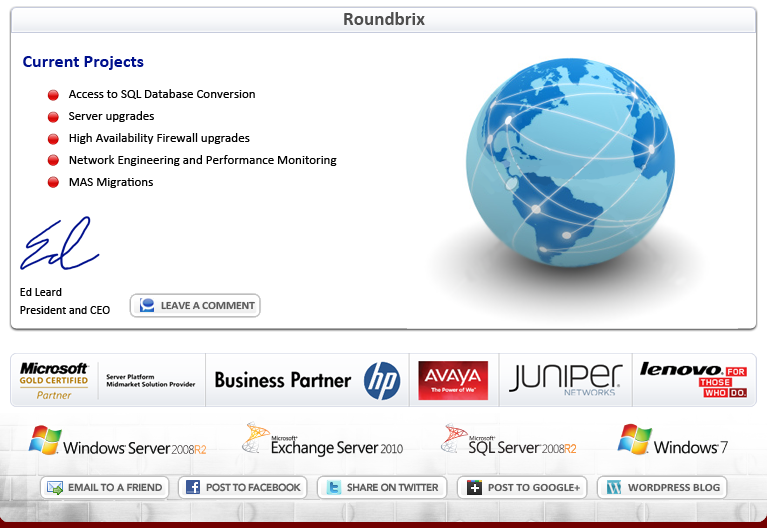You are receiving this email from a list acquired in the Orange County Business Journal. |
| |
|
September 19, 2011 |
|
| Six Keys to Avoiding Data Loss |
At Roundbrix, we take data very seriously. After all, it's the only thing we really cannot replace. Given that, there's a few safeguards that we
recommend so your data sleeps as well as you do!
| |
1. Know Where Your Data Lives. This may sound silly, but what if you had nightly backups running, lost something, and
went to restore the data only to find out you weren't backing it up? Folks, this happens more than you would ever want to
know. Often times data is on desktops when it should really be on a server where it gets backed up. Good company policy
and procedures with occasional QA here is best practice. |
And remember, if you install a new program on the server, create a new volume on a server or a new database, know that it has to be
selected to be backed up. Just because it's on the server doesn't mean it's backed up!
2. Backup Nightly with a Verify Pass. This is key to ensure that your data is restorable from the media. We used to call this "read after
write" as it simply verifies that what is believed it wrote is indeed what can be read back. A simple check box verifies that all is well come
'restore' time!
| |
3. Take a Backup Offsite at Least Weekly. This is where you have to think through your pain threshold for data loss. In other
words, if you're building burned down, would losing a week's worth of data make it even more painful? If the answer is an
emphatic 'YES', then that means you need to take a tape offsite more frequently than weekly. Do remember a couple of
things about taking tapes offsite. First rule is they don't survive well in heat or moisture so get a proper transport and
storage container. Second rule is ensure it is secure as the tape includes all your company information and if misplaced,
creates a liability. You'll want to account for your tapes periodically to ensure one didn't 'fly the coup'. If you're a Roundbrix
client, you can use our secure biometric-secured facility to store your backup data as frequently as you would like. |
4. Periodic Reviews of What is Being Backed Up. This little step that we like to do every quarter to catch new areas created. Face it, we get
busy and things fall through the cracks as we're only human. Also, we occasionally find new databases that not only aren't being backed up,
but not set up properly for maintenance, safety and controlling growth. To know how to set up a database maintenance plan, see the article we previously wrote here.
| |
5. Redirect My Document Folder to Server using Group Policy. Desktops and laptops will fail, but what's important is that
it does not take sensitive company data with it. Also, if it gets stolen or misplaced, has this just put your entire company at
risk? Folks, keeping autonomy between the company data and the desktop/laptop device any more than absolutely
required is simply good business. One of these failing should not send dangerous ripples through an organization like "Oh,
Ed had all the company financials and client lists on his computer and now they are gone!" |
6. Know How You Would Restore From Scratch. In a crisis situation, this is not the time to "figure things out". We have "been there and
done that" so rest assured we can get you back to where you need to be is short time. After all, the name of the game is first prevention,
and secondly restoration. If the restorations took a month, what would be the point?
|
|

|
23172 Plaza Pointe, Suite 285, Laguna Hills, CA 92653 |
To make sure this and future emails arrive in your inbox rather than your junk mail folder, add "noreply@roundbrix.com" to your
address book or safe list. To unsubscribe from this type of email,click here. Having trouble viewing this email?Click here. | |




